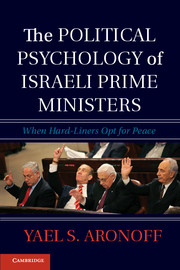Book contents
- Frontmatter
- Dedication
- Contents
- Preface
- Acknowledgments
- 1 Introducing the Conceptual Framework
- 2 Yitzhak Shamir: Once a Hawk, Always a Hawk
- 3 Benjamin Netanyahu: Battling the World
- 4 Ariel Sharon: From Warfare to Withdrawal
- 5 Yitzhak Rabin: From Hawk to Nobel Prize Peacemaker
- 6 Ehud Barak: All or Nothing
- 7 Shimon Peres: From Dimona to Oslo
- 8 The Psychology of Political Conversion
- Appendix A Summary of Key Factors and Findings
- Appendix B Interviews Conducted by the Author
- Bibliography
- Index
- References
1 - Introducing the Conceptual Framework
Published online by Cambridge University Press: 05 June 2014
- Frontmatter
- Dedication
- Contents
- Preface
- Acknowledgments
- 1 Introducing the Conceptual Framework
- 2 Yitzhak Shamir: Once a Hawk, Always a Hawk
- 3 Benjamin Netanyahu: Battling the World
- 4 Ariel Sharon: From Warfare to Withdrawal
- 5 Yitzhak Rabin: From Hawk to Nobel Prize Peacemaker
- 6 Ehud Barak: All or Nothing
- 7 Shimon Peres: From Dimona to Oslo
- 8 The Psychology of Political Conversion
- Appendix A Summary of Key Factors and Findings
- Appendix B Interviews Conducted by the Author
- Bibliography
- Index
- References
Summary
The history of peacemaking between Israel and her Arab neighbours showed that it was the change of mind of the hawks and the shift in their positions, not the preaching of the doves, that allowed Israel to exploit chances of peace at vital crossroads. The major breakthroughs in peacemaking were made and legitimized by the hawks.
– Shlomo Ben-Ami, Israeli Foreign Minister at Camp David negotiations, 2000Why do leaders make peace? Why do some leaders who defiantly vow that they will never negotiate, never make concessions to an enemy, sometimes dramatically shift course and do precisely that? How does this shift in perception happen – a shift from seeing your adversary as an enemy deserving a bullet to a partner deserving a handshake? This book analyzes the conversion of leaders from hard-liners to negotiators of peace, and the way these conversions influence the timing and probability that peace can be achieved. Although changes within the enemy and in the regional and international context are necessary elements in explaining decisions to negotiate, the perceptions of individual leaders make a significant difference in determining if and when a peace agreement will end a conflict.
Changes in the international and regional balance of power are often insufficient to explain accommodation with a long-standing enemy. There can be generation-long gaps between these changes and eventual cooperation. Just as important as the actual changes in the structural environment is the recognition of such changes by leaders. This engenders the debate between the more deterministic structural adjustment model of adaptation to environmental change, in which actors will respond similarly to environmental change, and the learning model that expects that different perceptions of changes in the environment will lead to varied reactions. I necessarily ask questions put forth in the literature on learning: Are some types of people more likely to learn than others? Through what processes do political leaders learn? How quickly do they learn? From what types of events do they learn?
- Type
- Chapter
- Information
- The Political Psychology of Israeli Prime MinistersWhen Hard-Liners Opt for Peace, pp. 1 - 18Publisher: Cambridge University PressPrint publication year: 2014



